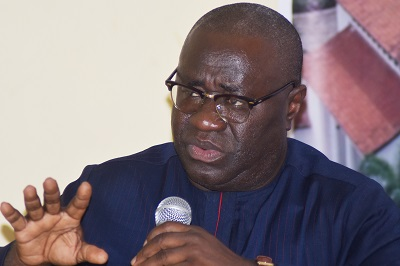Security consultant Prof Kwesi Aning has highlighted that the conflict in Bawku has evolved beyond ethnic tensions and chieftaincy disputes, now being primarily driven by organised crime and a transnational network.
Speaking on the JoyNews AM Show, he revealed that the violence, which has been ongoing for years, is now primarily driven by organised crime rather than the ethnic tensions and leadership struggles that initially sparked it.
Prof Aning emphasised that the situation in Bawku is far more complicated than most people realize.
“The presupposition and the common perception are that what is happening in Bawku is essentially a conflict between two groups of people. My agreement, however, is that it has transcended these two groups. It has also moved beyond chieftaincy issues,” he explained.
He pointed out that the real force behind the continuing violence is criminal networks, which have capitalised on the existing ethnic and traditional leadership tensions in the region.
“What we are witnessing in Bawku today is being driven more by criminality and a transnational network. These criminal groups use the notions of ethnicity, ethnic identity, and long-standing suspicions surrounding chieftaincy to further their agendas,” Prof Aning noted.
Although the professor refrained from delving into sensitive details about the criminal groups involved, he made it clear that the conflict has become much more complex. “But I cannot delve too much into this, as I hold a public office, and such matters are sensitive,” he said. His comments, however, underscore the significant role criminal groups are playing in fueling the violence in Bawku.
Prof Aning also criticised the popular narrative that frames the conflict as merely an ethnic or chieftaincy issue.
He warned that this view oversimplifies the situation and can worsen the violence.
“The argument that it is simply an ethnic or chieftaincy issue is false. It does not help the situation at all. In fact, it may even exacerbate tensions, which are already at a breaking point,” he stated.
The professor pointed to the government's inability to effectively address the crisis, given the lack of resources and strategic planning.
“I can assure you that the situation is a delicate one, on the verge of becoming a scorched-earth policy. We do not have the necessary resources or the strong foundation to resolve this effectively. There is a need for more strategic focus, and without that, the crisis will only deepen,” he said.
Professor Aning concluded with a stark assessment of the government’s capabilities, stating, “That I can tell you, and we cannot calm the conflict. We don’t have the resources, we don’t have the backbone.”
Latest Stories
-
Africa World Airlines to reduce air fares by end of June 2025
1 hour -
Nationwide crackdown: Ghana’s Anti-Galamsey Task Force intensifies operations
1 hour -
TOR debt rose to a record $517m as of December 2024
1 hour -
‘Good Girl No Dey Pay’ but it cost me plenty – Maya Blu gets candid
2 hours -
GFA imposes transfer ban on Hearts of Oak over unpaid $70,000 debt to New Edubiase
2 hours -
TOR to resume full operations in October 2025 – Acting MD
2 hours -
Celestine Donkor headlines Exceptional Gratitude concert in Italy
3 hours -
Ghana’s international reserves to be quickly eroded by a sharp decline in gold prices – Fitch Solutions warns
3 hours -
T-bills: Government fails to meet target for 4th consecutive week; investors prefer BoG bills
3 hours -
BDCs up in arms against Laycan disruption
3 hours -
Galamsey fight: 4 excavators seized at Kyebi; offenders flee Birim River
3 hours -
Ecobank-JoyNews Habitat Fair wraps Day 3 with record deals
4 hours -
Ghana’s flooding crisis: An engineer’s perspective
4 hours -
Ayisi releases official music video for ‘Yɛn Ware’ – A love letter in motion
4 hours -
Ellembelle: 11 Chinese illegal miners arrested; excavators, other equipment seized
4 hours

